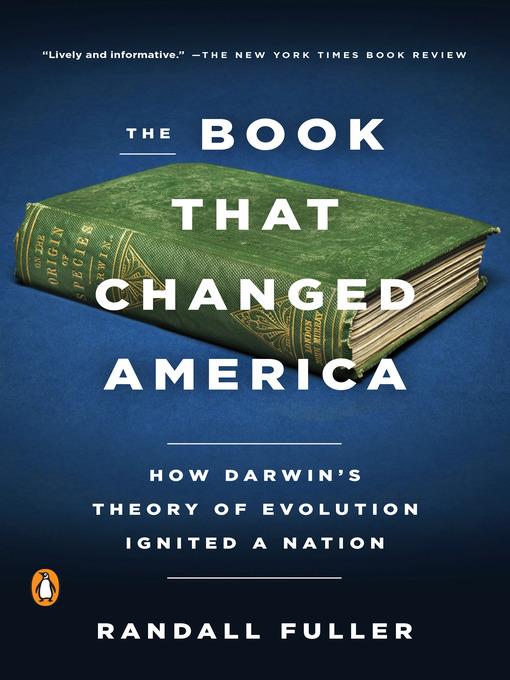
The Book That Changed America
How Darwin's Theory of Evolution Ignited a Nation
کتاب های مرتبط
- اطلاعات
- نقد و بررسی
- دیدگاه کاربران
نقد و بررسی

Starred review from November 7, 2016
In this inventive work, which weaves two powerful events into a vibrant tapestry of antebellum intellectual life, Fuller (From Battlefields Rising), professor of English at the University of Tulsa, beautifully describes how the engagement by a group of Transcendentalists with Darwin’s newly published On the Origin of Species deepened their commitment to the antislavery movement. Still reeling from abolitionist John Brown’s 1859 raid on Harpers Ferry, Transcendentalists (and Brown supporters) Franklin Sanborn, Charles Loring Brace, Bronson Alcott, and Henry David Thoreau quickly devoured Darwin’s book and recommended it to others. All people were biologically related, Darwin’s work hinted, which Transcendentalists interpreted as a repudiation of the belief that “African-American slaves were a separate, inferior species.” Fuller shares the Transcendentalists’ knack for clearly presenting complex ideas. He nimbly traverses the details of the scientific debate between Jean Louis Rodolphe Agassiz and Asa Gray over the theories of polygenism and evolution. There’s a glimpse of Louisa May Alcott, inspired by Darwin’s book to write a daring story of interracial love. Elegant writing and an unusual approach to interpreting the time period make this a must-read for everyone interested in Civil War–era history. Illus. Agent: Marianne Merola, Brandt & Hochman Literary.

Starred review from November 1, 2016
A vibrant history of the reception of Charles Darwin's ideas by American minds and spirits.With the theory of evolution still generating controversy, Fuller (English/Univ. of Tulsa; From Battlefields Rising: How the Civil War Transformed American Literature, 2011, etc.), a Guggenheim and National Endowment for the Humanities fellow, focuses on the immediate response to Darwin's On the Origin of Species by a handful of prominent American thinkers: Harvard botanist Asa Gray, first to read the book; his intellectual adversary Louis Agassiz; transcendentalists Ralph Waldo Emerson and Henry Thoreau; ardent abolitionist and educator Franklin Sanborn; Bronson Alcott, "the most radical idealist in America"; and Charles Loring Brace, a social reformer who shared his cousin Gray's copy with his New England friends. Drawing on his protagonists' public and private writings and letters, steeped in mid-19th-century culture, Fuller creates a rich tapestry of personalities and roiling ideas. In radiant prose, and with a sure eye for the telling detail, the author reveals the shattering impact of Darwin's book on religious thought, scientific inquiry, and especially on debates over slavery and, indeed, on the status of blacks on the evolutionary scale from beast to man. Even those who did not read the book itself, though it was easily available, had access to its ideas from reviews in important magazines, many of which "focused on the work's ethnological implications" to racial theories or criticized Darwin for undermining religion. Gray, who championed Darwin's ideas, tried mightily to reconcile them with his own theological convictions. Could natural selection "explain all of nature's marvels?" he asked. Surely it would take some omnipotent designer to create the human eye. Fuller asserts that "every nuance and involution in the book" refocused Thoreau's investigations into nature, and he shows how both pro-slavery advocates and abolitionists used Darwin's theories to defend their positions. Lincoln was vilified in pro-slavery cartoons, portrayed as a gorilla or "the missing link between blacks and whites." A fresh, invigorating history of philosophical and political struggles.
COPYRIGHT(2016) Kirkus Reviews, ALL RIGHTS RESERVED.

Starred review from January 1, 2017
Published during an extraordinarily turbulent time in the history of the United States--just prior to the Civil War and just after John Brown's raid on Harpers Ferry--Charles Darwin's On the Origin of Species (1859) would prove to have a significant impact on the country. Fuller (English, Univ. of Tulsa; From Battlefields Rising: How the Civil War Transformed American Literature) introduces the subject, focusing on a dinner party consisting of four of the most important America intellectuals and abolitionists of the time: Franklin Benjamin Sanborn, Charles Loring Brace, Amos Bronson Alcott, and Henry David Thoreau. During the gathering, Brace presented a copy of Darwin's seminal work. The title would profoundly affect them all, especially because it seemed to support abolitionism and unsettle their personal beliefs. By positing a common ancestor for all living creatures and intimating that all human beings were biologically related, Darwin demonstrated to proponents of slavery that they could no longer justify the institution with the assertion that blacks belonged to a different species than whites. Fuller is a skilled author who expertly describes the setting and the tension of the era. His informative volume reads like a novel. VERDICT This fascinating account is recommended for those interested in literature, science, or 18th-century American history. [See Prepub Alert, 7/25/16.]--Dave Pugl, Ela Area P.L., Lake Zurich, IL
Copyright 2017 Library Journal, LLC Used with permission.

























دیدگاه کاربران